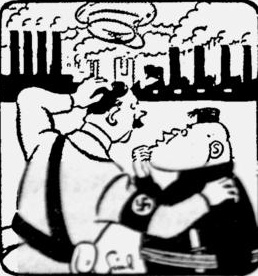The Pittsburgh Press (November 6, 1941)
Henry McLemore’s viewpoint –
We’re too late, eh? Hitler, Mussolini should see war factories of Buffalo
By Henry McLemore
Buffalo, NY –
This is my first day in Buffalo amd already I wish Adolf Hitler were with me.
He wouldn’t like any part of Buffalo.
It is a city that would make him completely miserable. It throbs with defense activity.

The smoke you see to your right comes from chimneys of a plant turning out machine guns. The stream of cars moving to your left is carrying night shift workers to an airplane factory. The flares you see against the sky in the north comes from steel mills, turning out the plate for tanks and guns.
Within the space of a few months, Buffalo’s industries have been geared to production for battlefields. A shock absorber plant now deals in guns. A windshield wiper factory turns out instruments to guide pilots home after bombings of the invasion coast of France.
I wished particularly for Hitler and Mussolini when I visited the Curtiss Wright Company. Last April, men and machines moved onto a mud-soaked field and started the construction of a building whose blueprints called for 1,196,000 square feet in working space. Exactly 193 days later, that vast building was completed and the manufacture of fighter ships was begun.
Sees plant operating
I saw that plant in operation today. With commendable showmanship, a Curtiss Wright official led me through ordinary office building halls and without any words of buildup, opened a heavy door and walked me straight onto a balcony.
The sight that greeted me was terrific.
It had the impact of a Louis fist on the chin.
Below us on a working floor that spread four acres was the gigantic cradle of the Curtiss Wright P-40, one of the finest fighting ships in the world. The din was overpowering. Automatic hammers sang their supersong of the woodpecker. Drills screeched. 7,000 men – the day shift – moved efficiently through the inferno. Fountains sprayed paint. As far as the eye could see, there were airplanes and parts of airplanes. The strange camouflage of the British blended with the olive drab of the U.S. Army paint job. Row after row of fuselages and engines and wings. Some with the circle insignia of the British. Some with the star of this country’s air force.
Young workers, old workers
In this corner, old and knowing men worked at complicated machines, turning out precision tools for the use of the workmen a few aisles away. Across the way from the old and knowing men, youngsters were going to school to learn how to become master craftsmen.
Overhead giant cranes rolled on noiseless tracks to pick up finished jobs and carry them to the testing hangars. Test pilots strolled about, parachutes strapped to their backs. On this line, machine guns were fitted into wings.
I walked down from the balcony and wandered about the unbelievably vast plant. Overhead fluorescent lights, which are never turned out, cast their weird glare. 24 hours a day the workmen come and go. And off the lines roll machines that will fly the skies of Europe and challenge the might of the dictators.
One hears so much of the efficiency of the dictator nations. A democracy, where men are free, has no chance to compete on an equal footing. Propaganda, pure and simple. Here in Buffalo, a city that next to New York must be the nearest thing to a melting pot of the world. Free men have answered the challenge of the slave labor that must work without expression.
Worker is considered
In seven years of planning, Germany never produced a factory more efficient than the Curtiss Wright plant in Buffalo. Everything that goes into a fighting ship is at the fingertips of the workmen. Everything for the comfort of the workmen is at the fingertips too. A complete hospital. Two cafeterias. A sports program. Locker rooms which provide a locker (equipped with combination lock) for every worker.
And – this above all – the American flag flying above every one of the assembly lines. The flags were not bought by the company officials, nor were they hung on orders from the government. The flags were bought by money voluntarily contributed by workmen – nickels, dimes and quarters from the men who are keeping 'em rolling.
Hitler and Mussolini have said we came in too late.
My first day in Buffalo has convinced me they spoke too soon.